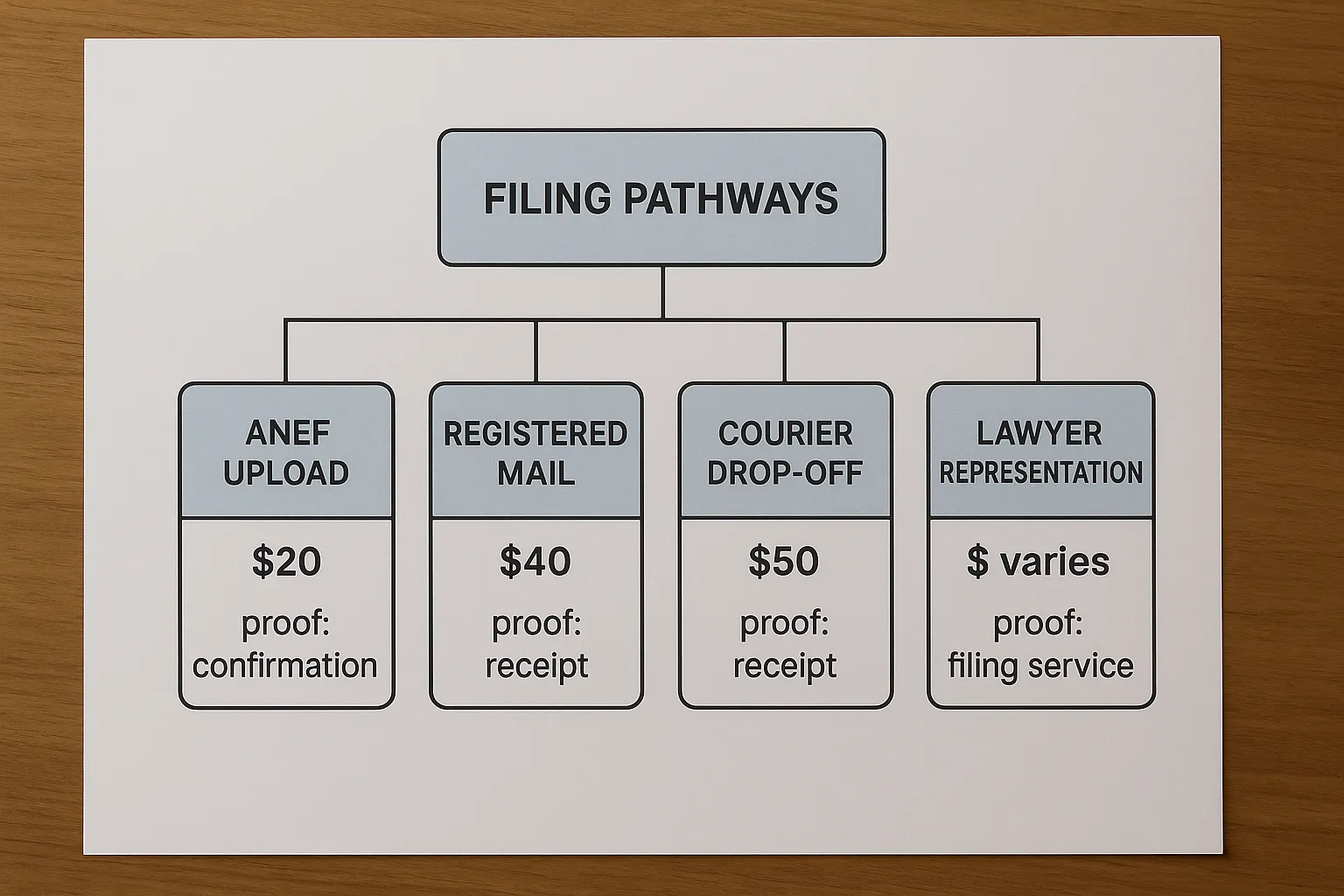Prefecture Courier Services: Pros, Cons, and Cost Comparison

Long before France rolled out its ANEF online portal, a parallel industry quietly bloomed outside Parisian prefectures: professional couriers who queue, deposit, and collect immigration files on behalf of busy applicants. In 2025 these “courrier préfecture” services still have a loyal clientele—HR departments managing dozens of foreign hires, families juggling school runs, and over-worked students racing between lectures and part-time jobs. Yet many newcomers wonder whether paying a runner is really worth it now that most procedures can be filed digitally.
This guide unpacks how prefecture courier services operate, their legal status, real-world advantages and drawbacks, and—crucially—the price tag compared with do-it-yourself options or full legal representation. By the end you will know when a courier makes sense, how to spot shady operators, and which alternatives (including ImmiFrance’s assisted filing packages) may save you money and headaches.
1. What Exactly Is a Prefecture Courier Service?
A prefecture courier is a private business (or independent runner) that physically delivers immigration paperwork to the préfecture and, if authorised, retrieves récépissés, cards or correspondence. Typical tasks include:
- Submitting a first-time residence-permit or renewal dossier at the “dépôt” counter.
- Picking up a récépissé or 10-year card once the applicant receives the SMS notification.
- Filing supplementary evidence requested by the prefecture (“pièces complémentaires”).
Most couriers operate on a per-mission basis—one power of attorney (procuration) per applicant—although some offer monthly subscriptions for corporate clients.
Legal Framework
French administrative law allows representation by a third party as long as the person presents written authorisation (Article L114-10 Code des relations entre le public et l’administration, CRPA). However, individual prefectures remain free to:
- Limit courier access to specific time slots.
- Refuse bulk drop-offs if the courier cannot answer case-specific questions.
- Require original ID of the applicant for certain steps (e.g., biometrics).
Before hiring a runner, always verify your prefecture’s internal rules—many publish them on the préfecture website or inside the foyer.
2. Pros: When a Courier Can Be a Lifesaver
- Time savings in high-density départements. At Paris-Boulevard Ney or Bobigny, queues start before dawn. A professional runner typically lines up with dozens of files, letting you avoid a six-hour wait.
- Meeting hard legal deadlines. If your permit expires on a strike day (see our “Prefecture Strike Calendar 2025”), a courier can deposit your file the day before or the morning of the strike, preserving your rights.
- Immediate proof of filing. Reputable firms photograph the dépôt ticket or obtain a stamped receipt—valuable evidence if the prefecture later loses paperwork (compare with our guide on “Lost Prefecture Mail”).
- Bulk management for employers. HR departments sponsoring multiple Passeport Talent or “Salarié” renewals offload logistics and focus on onboarding.
- Language barrier buffer. Couriers fluent in French can clarify which window to use and which token to take, reducing mis-direction.
3. Cons: The Side of the Coin You Rarely Hear About
- Cost escalation. One-off fees range from €70 in provincial towns to €190+ in Paris. Rush pickup plus drop-off can exceed €300.
- Limited liability. If the courier mis-files a document or loses your passport, contracts often cap compensation at a token amount.
- No legal advice. Couriers are messengers, not lawyers. They cannot challenge an OQTF, argue about missing payslips, or fix an ANEF error.
- Data-privacy risks. Your passport biodata, tax returns and bank details pass through a third party; not all runners comply with GDPR.
- Prefecture discretion. Some préfectures (e.g., Nantes naturalisation platform) bar couriers entirely for first-time filings, forcing in-person attendance.
4. Real-World Cost Comparison (2025)
| Filing Method | Typical Direct Cost* | Proof of Submission | On-Site Wait Time (Applicant) | Added Legal Review |
|---|---|---|---|---|
| Self-service, in person | €0 – €15 (transport) | Hand-stamped receipt | 2–6 h | None |
| Registered mail (Lettre RAR) | €6.45 | Digital tracking + AR slip | 0 h | None |
| Prefecture courier (runner) | €70 – €190 per trip | Photo of dépôt ticket or stamped receipt | 0 h | None |
| ImmiFrance assisted digital filing + optional registered-mail kit | From €129 flat (pricing list shown at checkout) | ANEF submission certificate + RAR slip | 0 h | Included document audit & lawyer network |
| Lawyer drop-off (full mandate) | €600 – €1,200 | Hand-stamped receipt | 0 h | Comprehensive legal representation |
*Estimated metropolitan-France prices collected July 2025. Transport not included for self-service.
Key Takeaways
- For single renewals with simple paperwork, registered mail remains the cheapest way to obtain traceable proof.
- A courier becomes cost-efficient primarily when the time you save (or hourly salary you avoid losing) exceeds the fee.
- If your file is complex or at risk of refusal, channel the same budget toward legal review instead of pure logistics.
5. Hidden Fees and Red Flags
Because the niche is lightly regulated, unscrupulous actors flourish. Watch out for:
- “Carte de séjour guaranteed” marketing. No courier can influence a prefecture decision.
- Cash-only payments without invoice—difficult to prove in disputes.
- Bundled photocopy or translation charges inflated 3-4× retail cost.
- Data harvesting clauses giving the runner permission to reuse your personal information.
Request a written quote, insist on a GDPR-compliant privacy notice, and verify the SIRET number on infogreffe.fr.
6. Checklist: Do You Really Need a Courier?
Answer these five questions before pulling out your wallet:
- Is the procedure available on ANEF? If yes, upload from home.
- Can a Lettre RAR suffice? Most préfets accept it for supplemental documents and renewals.
- Is an in-person biometrics capture required? No courier can replace you for fingerprints.
- How tight is your expiry date? If you have >30 days, you can likely book a slot or send mail.
- Do you need legal strategy, not just delivery? Consider a lawyer or an ImmiFrance advisory session instead.

7. Alternatives at a Glance
- ANEF online portal: Mandatory for most “Passeport Talent”, “Salarié”, “Étudiant” and naturalisation applications since 2023.
- Lettre recommandée avec accusé de réception (RAR): Legally recognised under CRPA Article R112-3; costs under €7 and provides digital tracking.
- ImmiFrance Assisted Kit: We compile your application, double-check documents, generate a power of attorney if a courier is still needed, and file digitally or by RAR—leaving you with airtight evidence and real-time tracking in your dashboard.
- Lawyer Mandate: Full representation, ability to submit mémoires, negotiate with the préfet, and appeal refusals or OQTFs.
8. Case Snapshot: Renewal During a Strike Week
Svetlana’s “Vie privée et familiale” card expired on 18 March 2025. All online slots in Lyon were booked until April and a nationwide civil-service strike was announced for 17 March. A €95 courier quoted same-day dépôt with a 48-hour notice.
Instead, Svetlana booked ImmiFrance’s Urgent Renewal Pack (€129). An adviser built her ANEF dossier, attached scans, and—anticipating a possible web outage during the strike—prepared a registered-mail fallback. La Poste’s digital tracking confirmed delivery on 15 March; the préfecture issued a récépissé digitally on 19 March. Total savings vs courier: €34 and zero queue anxiety.
9. How ImmiFrance Fits into the Equation
While ImmiFrance is not a physical courier, our hybrid model gives you the same stress-free experience at a predictable cost:
- Personalised document audit so your file is accepted first time.
- Real-time case tracking inside your secure portal.
- Registered-mail label generator with pre-filled prefecture address.
- On-demand lawyer referral if complications arise (OQTF, additional interviews).
If you still need a runner—for example, to collect a physical card in Paris-Ney—we can connect you with a vetted partner at negotiated rates.

10. Bottom Line
Prefecture courier services remain a legitimate tool, particularly in Ile-de-France where queues stretch around the block. But in 2025 they are no longer the only or even the cheapest way to secure a stamped receipt. Before paying €150 for a runner, price out a registered letter and consider whether professional legal insight would bring more value than mere document delivery.
Ready to streamline your next residence-permit or naturalisation application? Book a free 15-minute eligibility call with an ImmiFrance adviser and discover how our assisted kits can save you both time and money while keeping your sensitive documents in safe hands.
